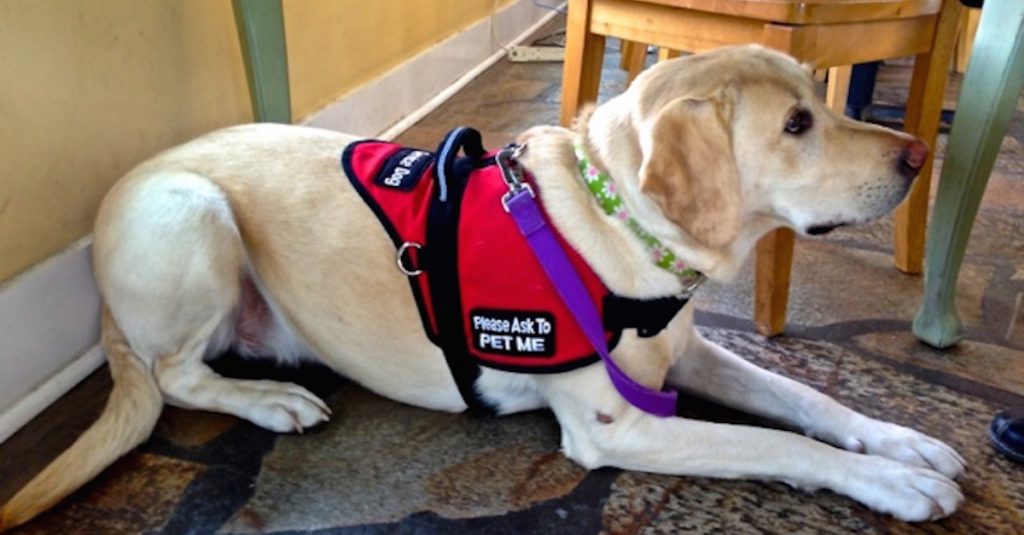By: Morgan Stolpa
Minnesota State University, Mankato is committed to providing reasonable accommodations for students with disabilities.
A “service animal” is a dog that is trained to do work or perform tasks for the benefit of an individual with a disability. “Service dogs are allowed to go anywhere their owner goes on campus,” said Julie Snow.
However, the University may ask if the animal is required because of a disability as well as what work the animal has been trained to perform.
Examples of work or tasks include, but are not limited to:
- Assisting individuals who are blind or have low vision with navigation and other tasks;
- Alerting individuals who are deaf or hard of hearing to the presence of people or sounds;
- Providing non-violent protection or rescue work;
- Pulling a wheelchair;
- Assisting an individual during a seizure;
- Retrieving items such as medicine or the telephone;
- Providing physical support and assistance with balance and stability to individuals with mobility disabilities;
- Helping persons with psychiatric and neurological disabilities by preventing or interrupting impulsive or destructive behaviors.
“Owners are not required to register with Accessibility Resources unless they need other accommodations to ensure access to the University programs and facilities,” said Snow.
Emotional Support Animal:
An “emotional support animal” (ESA) is an animal that provides comfort to an individual with a disability upon the recommendation of a healthcare or mental health professional.
An emotional support animal does not assist a person with a disability with activities of daily living but rather its role is to live with a student and alleviate the symptoms of an individual’s disability to provide equal opportunities to use and enjoy housing at the University.
Upon approval, ESA’s are allowed in residence halls but must agree to the following expectations:
- Emotional support animals assisting individuals with disabilities are only allowed in their owner’s residence hall room and/or apartment unit and the most direct route to and from the exterior door of the building. Emotional support animals are not allowed in classrooms or any public facilities at Minnesota State University, Mankato.
- Licensure & Vaccination: Emotional support animals on campus must comply with all state & local licensure and vaccination requirements. Dogs must wear a license tag and a current rabies vaccination tag.
- Leash: Emotional support animals must be on a leash at all times when outside of the owner/keepers residential hall room/apartment, unless impracticable or unfeasible due to owner/keeper’s disability.
- Under control: The owner/keeper of an emotional support animal must be in full control of the animal at all times. The animal must not be disruptive (for example by barking) and cannot pose a direct threat to the health and safety of others on campus.
- The animal must be crated when owner is not in the room: An individual with a disability may be asked to remove an emotional support animal from University housing if the animal is out of control and the animal’s handler does not take effective action to control it. A person who has an emotional support animal on campus (including University Housing) is financially responsible for property damage caused by his or her emotional support animal.
- Clean-up: The care and supervision of an emotional support animal is the responsibility of the individual who uses the animal’s service. This includes clean-up of all animal waste. University Grounds/Maintenance and Residential Life may designate animal toileting areas. Those who are unable to physically pick up and dispose of feces are responsible for making all necessary arrangements for assistance on a daily basis.
Students interested in ESA’s can make an appointment with Julie Snow, Accessibility Resources Director, to discuss their circumstances and learn about the ESA documentation process. Students will need to:
- Provide documentation of their disability.
- Supply documentation from their provider verifying the ESA is part of the student’s therapeutic plan.
Therapy Animal:
Therapy animals provide affection and comfort to various members of the public, typically in facility settings such as hospitals, assisted living, and schools. These pets have a special aptitude for interacting with members of the public and enjoy doing so. Therapy animal owners volunteer their time to visit with their animal in the community. A therapy animal has no special rights of access, except in those facilities where they are welcomed. They may not enter businesses with “no pets” policies or accompany their handler in the cabin of an airplane regardless of their therapy animal designation.
Service dog owners with questions or concerns can contact Accessibility Resources for assistance and/or clarification. Phone: 507-389-2825 (v) 800-627-3529 or 711 (MRS/TTY) or via email julie.snow@mnsu.edu.
